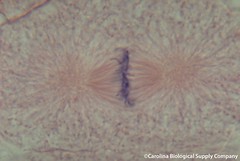Mitosis - AP Biology Flashcards
Terms : Hide Images [1]
| 5384548452 | G1 Phase | First stage of interphase in which cell grows and performs its normal functions. Cell is diploid. | 0 | |
| 5384548453 | G0 Phase | Cell is performing its normal functions, but has left the cell cycle and is not dividing. | 1 | |
| 5384548454 | S Phase | The synthesis phase of the cell cycle; the portion of interphase during which DNA is replicated. | 2 | |
| 5384548455 | G2 Phase | Last stage of interphase in which cell grows and performs its normal functions. Cell is tetraploid. | 3 | |
| 5384548456 | Interphase | Cell grows, performs its normal functions, and prepares for division; consists of G1, S, and G2 phases |  | 4 |
| 5384548457 | Prophase | Phase of mitosis in which chromosomes condense, nuclear membrane disappears, nucleolus disappears, and spindle fibers begin to form. |  | 5 |
| 5384548458 | Metaphase | Phase of mitosis in which spindle fibers help chromosomes line up on the midline of the cell. |  | 6 |
| 5384548459 | Anaphase | Phase of mitosis in which the chromosomes separate and move to opposite ends of the cell. |  | 7 |
| 5384548460 | Telophase | Phase of mitosis during which chromosomes uncoil, a nuclear envelope returns around the chromatin, and a nucleolus becomes visible in each daughter cell" |  | 8 |
| 5384548461 | Cytokinesis | At the end of telophase, actin fibers form an equator around the cell and contract, separating the cytoplasm into two daughter cells. |  | 9 |
| 5384548462 | Centriole | A paired cluster of microtubules near the nucleus in animal cells. This organelle organizes spindle fibers during mitosis. | 10 | |
| 5384548463 | Centromere | Region of a chromosome where the two sister chromatids attach to one another. Contains the kinetochore. | 11 | |
| 5384548464 | Kinetochore | A specialized region on the centromere that links each sister chromatid to the mitotic spindle. | 12 | |
| 5384548465 | Spindle Fibers | Made of microtubules that connect centrioles to kinetochores of chromosomes and that separate sister (mitosis) or homologous (meiosis) chromosomes during cell division | 13 | |
| 5384548466 | Chromosome | A threadlike, gene-carrying structure found in the nucleus. Each chromosome consists of one very long DNA molecule and associated proteins. | 14 | |
| 5384548467 | Chromatid | One of two identical "sister" parts of a duplicated chromosome. | 15 | |
| 5384548468 | Haploid | A cell with only one copy of each chromosome. | 16 | |
| 5384548469 | Diploid | A cell with two copies of each chromosome. | 17 | |
| 5384548470 | Tetraploid | A cell with four copies of each chromosome. | 18 | |
| 5384548471 | Karyotype | Micrograph of the complete diploid set of chromosomes grouped together in pairs, arranged in order of decreasing size | 19 | |
| 5384548472 | Cyclin-Dependent Kinase (CDK) | A group of protein kinases that are activated by the formation of a complex with a cyclin and are involved in the regulation of the cell cycle. Only active when bound to a cyclin. | 20 | |
| 5384548473 | Cyclin | A cellular protein that occurs in a cyclically fluctuating concentration and that plays an important role in regulating the cell cycle. | 21 | |
| 5384548476 | p53 | This tumor suppressor gene causes cell cycle arrest in G1, providing time for DNA repair. If repair is successful, cells re-enter the cycle. If unsuccessful, apoptosis. Damage to this protein can cause cancer. | 22 | |
| 5384548477 | Proto-oncogene | A normal cellular gene corresponding to an oncogene; a gene with a potential to cause cancer but that requires some alteration to become an oncogene. | 23 | |
| 5384548478 | Tumor Suppressor Gene | A gene whose protein products inhibit cell division, thereby preventing uncontrolled cell growth. Mutations in this gene can cause cancer. | 24 | |
| 5384548479 | Kinase | An enzyme that adds a phosphate group to a protein. Phosphorylation usually activates protein activity. | 25 | |
| 5384548480 | Phosphatase | An enzyme that removes a phosphate group from a protein. Phosphorylation usually activates protein activity. | 26 | |
| 5384555906 | growth factors | Factors that stimulate the cell to divide. | 27 | |
| 5384565273 | cancer | Disorder in which some of the body's cells lose the ability to control growth; A disease in which the body cells grow & divide uncontrollably, damaging the parts of the body around them. | 28 | |
| 5384586562 | metastisis | spread of cancer cells | 29 | |
| 5384588818 | treatments for cancer | surgery; radiation; chemotherapy; immunotherapy | 30 | |
| 5384614526 | angiogenesis | the process through which a tumor supports its growth by creating its own blood supply by recruiting new blood vessels | 31 | |
| 5384623592 | normal cell cycle regulators | adhesion; crowding/density-dependence; growth factors | 32 |
